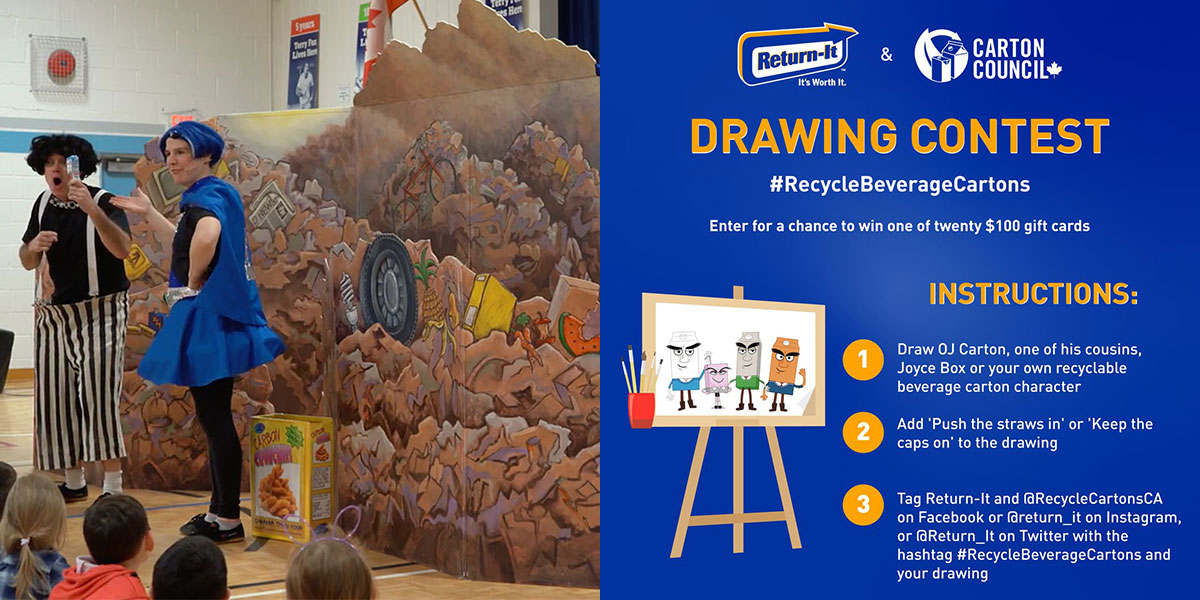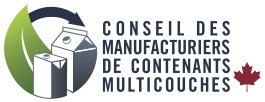Summer 2023 Newsletter
Volume 10, Issue 1
Surveys on Carton Recovery in B.C. Schools Suggest Pathways for Improvements
One of the Carton Council of Canada’s critical tasks is to contribute to the collection, compilation and sharing of data on the recovery of food and beverage cartons across the country. We do that to assist the recycling ecosystem in evaluating the strength of recovery efforts and to discover where attention might be required. One area in which we have been seeking greater clarity is recovery in schools, since so many portion pack beverage cartons are consumed there.
For this reason, we were eager to seize the opportunity presented to us in British Columbia by Encorp Pacific, the managers of the province’s Return-It beverage container deposit-return program, and Dreamrider Productions, a non-profit that provides environmental education for school-aged children. Both approached the Carton Council proposing partnerships that would include surveying K-12 schools on their carton recovery practices. Up to then, we had none of these insights specific to B.C.
The two surveys were conducted earlier this year, with a total of approximately 220 establishments responding across the province. Encouragingly, our key finding was that a vast majority of schools—more than three quarters of them—are recovering students’ juice boxes and milk cartons on their premises, whether it be through the Return-It program or their local multimaterial blue bin collection system. Still, we would like to see that proportion pushed higher.
With those who answered they were not recovering cartons, we probed further to understand why. The reasons offered varied, with some that should be fairly easy to address, and others that might require more sustained, concerted efforts. The simplest actions will certainly be to dispatch bins and informational materials like recycling posters to those schools that indicated that the absence of these was an obstacle to recovery.
On the other hand, many respondents cited limited interest from staff or students as a key challenge and still others referred to difficulties with storing recovered containers and taking them away for recycling. These more complex issues will have to be tackled through collaboration between recycling sector partners and the development and implementation of action plans. Such plans could also look at boosting rates even in schools that do already recover cartons, since as many as 60% of them may not be capturing all of them, according to our findings. In addition, special attention could be paid to schools that participate in milk programs, which our survey tells us might be nearly one in every two. The Carton Council of Canada is naturally ready to take part in such work.
The partnerships with Dreamrider Productions and Encorp Pacific also involved promotion and education activities. Funding provided to Dreamrider is supporting the non-profit’s 2023 season of its Zero Heroes live show that plans to tour between 150 and 200 of the province’s schools during the year. For the occasion, food and beverage cartons are being incorporated into the performances which aim to inspire students to become “recycling superheroes” both at school and at home. For its part, Encorp Pacific held a drawing contest with the Carton Council’s support featuring the carton characters from its “Return-It Collectible Gang”. You can read more about this campaign in another article of this issue of our newsletter, “Carton Council Partners with SARCAN, Return-It to Support Carton Recycling Awareness.”


In addition to school surveys, partnerships with Dreamrider Productions and Encorp Pacific in B.C. involved promotion and education activities.
Contents
- These are the Main Technological Solutions Available in Canada for Carton Sorting
- Surveys on Carton Recovery in B.C. Schools Suggest Pathways for Improvements
- Carton Council Partners with SARCAN, Return-It to Support Carton Recycling Awareness
- Carton Council of Canada Launches 2023 Community Education Award in Atlantic Canada
- Access to Carton Recycling Across Canada Reaches New Heights

